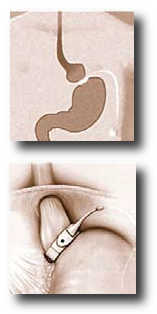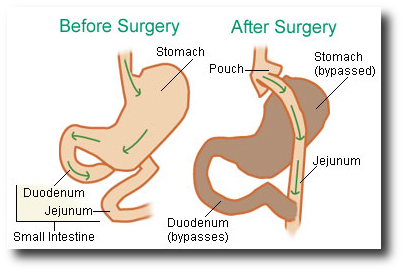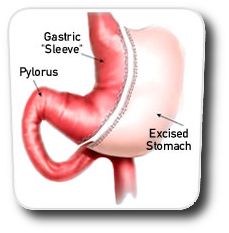
Bariatrics is the branch of medicine that deals with the causes, prevention, and treatment of obesity. The best way to lose weight is exercise and eating right, but many people have tried those methods for years and still can’t lose excess weight that can cause serious health problems. For people in this frustrating situation, weight loss surgery (bariatric surgery) at Great Lakes Surgical Associates may be an option.
There are a number of surgical options available to treat obesity, each with their advantages. GLSA commonly performs Laparoscopic adjustable gastric banding (Lap-Band surgery), Laparoscopic Roux-en-Y-Gastric Bypass and Sleeve Gastrectomy.
Click to see if Bariatric Surgery is right for you.
Click here for more information on Bariatric Surgery at Gratiot Medical Center.
Gastric Banding Surgery
In Gastric Banding Surgery a silicone belt goes around the top of the stomach. This results in the ability to control your hunger and achieve a “feeling of fullness” with less food. Ultimately, you eat much less and should feel full sooner. A key component of the Gastric Band System is its adjustability. A band is connected to a port, which enables the surgeon to inflate the device over time to expedite the weight loss.
The advantages of the Gastric Banding system:
– No cutting or stapling of the stomach
– Calibrated pouch and stomach size
– Can be adjusted to patient’s needs after surgery with a simple procedure
– Laparoscopic removal possible, fully reversible
– Short hospital stay (Typically does not exceed 48 hours).

Roux-en-Y Gastric Bypass Surgery
In Laparoscopic Roux-en-Y, the stomach is divided, and a small pouch, which limits calories that can be taken in on a daily basis, is formed as simultaneously the majority of the stomach is sealed off. A portion of the small intestine is then divided and sewn to the newly created small stomach pouch. Roux-en-Y achieves significant weight loss in the following two ways: by reducing the size of the stomach (effectively limiting the amount of food that can be consumed by the patient), and by creating a digestive “short cut” (reducing the amount of calories that can be absorbed by the patient’s digestive tract). Upon successful completion of Roux-en-Y gastric bypass surgery, patients benefit by eating less food, absorbing fewer calories, and, as a result, begin shedding excess pounds.

Roux-en-Y Gastric Bypass Surgery
Sleeve Gastrectomy is a restrictive bariatric surgery performed by GLSA. The surgeon creates a small, sleeve shaped stomach that limits the amount of food a person can eat, so they feel full sooner. It is larger than the stomach pouch created with the Roux-en-Y Bypass procedure. Sleeve Gastrectomy is typically an option for patients with a BMI of 60 or higher, and is normally performed as the first phase in a two-part treatment, the second usually being Gastric Bypass. Sleeve Gastrectomy patients have been shown to experience significant weight loss and health improvements. Studies have also shown that the resolution rate for type 2 diabetes, high blood pressure, high cholesterol, and obstructive sleep apnea were similar to the resolution rates for other types of restrictive procedures.

